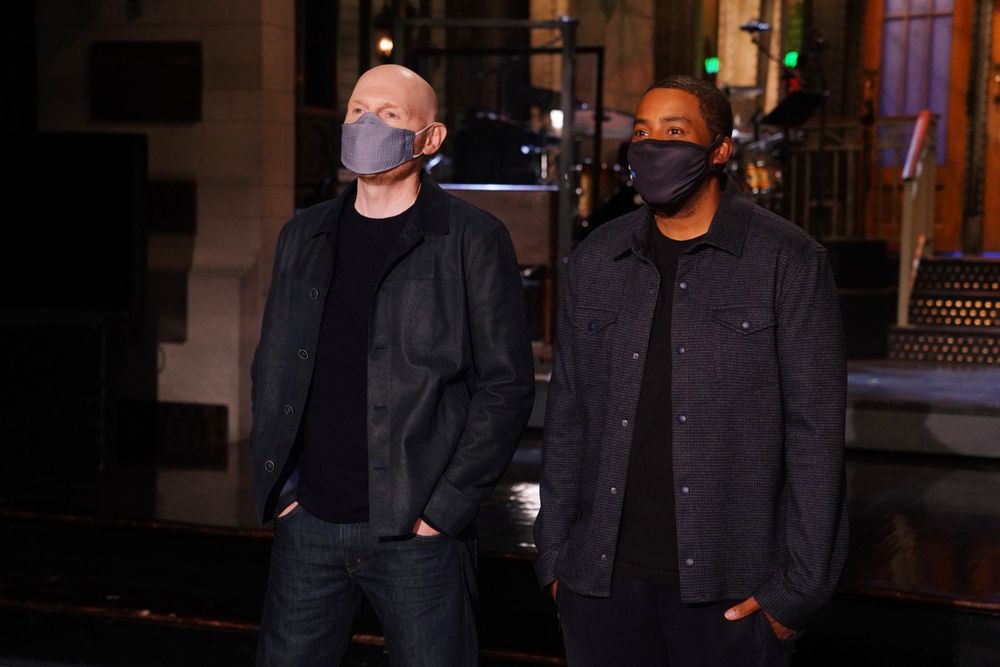Last weekend, Bill Burr’s Saturday Night Live monologue did exactly what anyone familiar with Bill Burr’s comedy could have expected: It blew up the internet.
The money shot, of course, was his bit on White women taking over movements made for and by people of color. It was masterful. It was also just good enough to make us forget that moments before he had tossed out a series of jokes that landed like a turd in a bucket of Kool-Aid. And they were all about comedians’ favorite subject: cancel culture.
First, Burr brought up how people last year tried to cancel John Wayne based on a Playboy interview from 1971, then pivoted to knowing how to dodge confronting conversations with your grandparents. The whole thing was predicated on the idea that all old people are racist — and the whole thing just died.
Even though it bombed I sincerely hope that Burr’s peers saw how his SNL monologue played out and finally came to the conclusion the rest of us have known for years: Cancel culture jokes just simply aren’t funny.
The problem with cancel culture jokes isn’t that they’re offensive. Offensive jokes still get laughs, especially if they’re executed with wit and originality — as Burr himself can attest. (Burr’s cancel culture bit was the least offensive part of his monologue; even saying that Pride Month is too long got more laughs.) The problem with cancel culture jokes is that they’re often the laziest, least creative, and most poorly written jokes in any comic’s repertoire. What comedians see as righteous outrage is simply dissatisfaction.
Making simple-ass jokes about trans people, beyond the fact it disregards an entire community of people, is about a bunker mentality — backing up their fellow comics over some made-up attack on “free speech,” even when the result falls short of their usual standard.
Think about Dave Chappelle’s Emmy-winning Sticks and Stones comedy special. There are highs that are as high as anything he’s ever done, like his Jussie Smollett bit. But when he goes into a spiel about trans people and imagining someone waking up and saying “I’m Chinese!” with a full-on stupid, stereotypical Asian accent. It offended the LGBTQ community, who made no qualms about voicing their disgust with his bit. But it was also just so far below the level of care, brilliance, and thought-provoking angles we know Chappelle can deliver when he’s on his A-game. He’s better than that and he knows it.
Compare that to these 90 seconds from rookie comedian Blake Griffin.
The problem is that comedians are seeing backlash as a sign of their audiences being too sensitive when it’s really that their jokes aren’t funny. And as comedians feel like they need to be more defiant in the face of some imagined political-correctness overreach, they’re forcing themselves to tackle these topics even if it makes sense or not. Making simple-ass jokes about trans people, beyond the fact it disregards an entire community of people, is about a bunker mentality — backing up their fellow comics over some made-up attack on “free speech,” even when the result falls short of their usual standard.
Sam Jay’s 3 In The Morning is a fantastic hour of stand-up that crushes many boundaries and norms in comedy. But when the comedian goes into a bit about trans women playing football or being better at fighting, it just doesn’t hit the same — in large part because it simply doesn’t hold up to the execution of the show’s first half. The first 30 minutes of the special showed us that Jay is smarter than the intellectual laziness it took to make those jokes.
Comedians don’t even need to listen to the “think piece writers” or “cancel culture bloggers” or any other imaginary critics. They can simply listen to their audiences. Just hearing the deafening silence after Burr’s cancel-culture bit and the muted laughter at Jay’s trans material should tell them that their jokes just aren’t landing. But in cases like these, comics seem determined to prove audiences wrong and are violating a central pillar of comedy in the process.
The entire reason comedians workshop their jokes, doing small-club tours, or surprise appearances is to make their material better. When audiences respond negatively, comedians either fix their jokes or scrap them altogether. But now comedians have abandoned that principle because they feel like they know what’s funny regardless of how audiences react — that their punchlines are suddenly beyond reproach, and anything that falls under the umbrella of “cancel culture” is hilarious on principle alone. Anyone who disagrees is just too sensitive.
Cancel culture isn’t ruining comedy, mostly because cancel culture doesn’t actually exist. Nobody gets canceled in the way that people who complain about cancel culture think people get canceled. Kevin Hart didn’t get canceled. Dave Chappelle didn’t get canceled. It just doesn’t happen. What comedians mean by “canceled” is more like “held accountable.” What they see as the end of their careers is simply a demand that they have the simple decency of reckoning with the harm they cause others, especially marginalized communities. That’s just basic humanity.
So, no, it’s not cancel culture that’s ruining comedy — it’s comedians’ reactions to cancel culture. Instead of trying to rage against the natural reactions of their audiences, they should maybe listen to that real-time feedback and focus on making viewers laugh more than convincing them they need to change to enjoy jokes. Funny shit is still funny; when Issa Rae hosts SNL tomorrow night, we’ll hopefully see that. But sometimes the other stuff needs to get left in the drafts.
